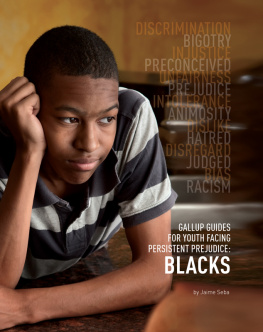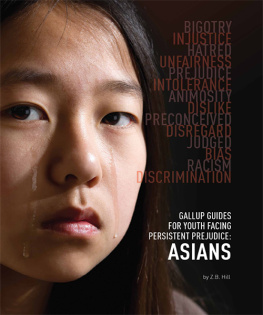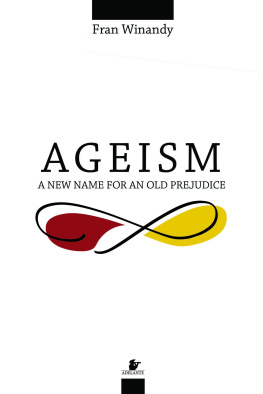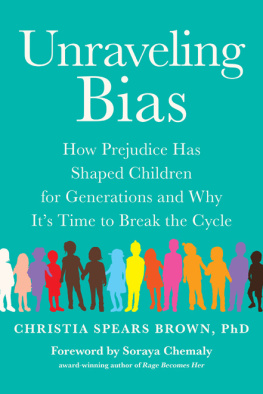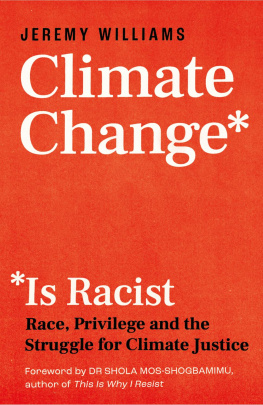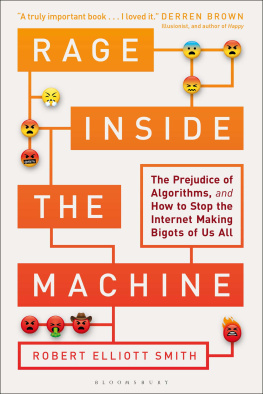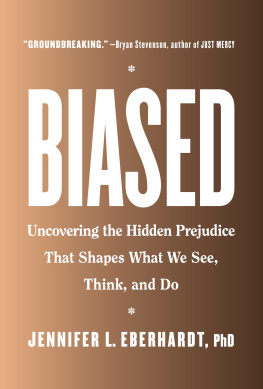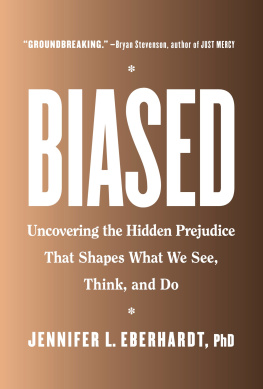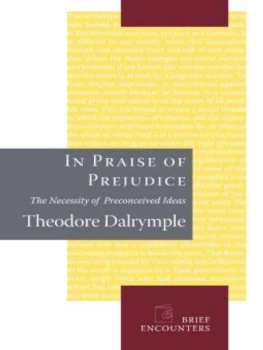CONTENTS
PART I
PART II
PART III
PART I
THE NEW PSYCHOLOGY OF RACISM
Introduction
The Editors
In 2007 economists Joseph Price and Justin Wolfers found that National Basketball Association referees are more likely to call fouls on players of a different race from themselves. Price and Wolferss findings were roundly dismissed across the league. Rod Thorn, the leagues former vice president of basketball operations, flatly stated, I dont believe it. One veteran player, Mike James, remarked, If thats going on, its something that needs to be dealt with but Ive never seen it.
James makes a good point: such statistical evidence is often very difficult to perceive with the naked eye; as a result, there is a tendency to dismiss such data as coincidence. Yet the point of this finding is that it represents not single games, individual referees, or individual players, but rather stable trends that summarize the behavior of many individuals over a large number of foul callsin this case, over a half million through the course of thirteen professional seasons. In 2007 a similar analysis of Major League Baseball data reached a strikingly similar conclusion: that umpires are more likely to call a given pitch a strike when the pitcher is of their same race. Here, the database consisted of more than a million pitches over the course of two seasons. It becomes difficult to make a case for coincidence.
These studies are about a lot more than foul calls and strikeouts. Theyre about the nature of racism today: subtle, pervasive, persistent. And they force us to consider some uncomfortable questions. If umpires and referees, who are professionally trained to avoid bias, are still subject to racism, what hope is there for the rest of us? Is racism more deeply rooted in the human psyche than wed like to admit? Are we, in fact, born racist?
These are the questions that animate this book, and theyre the questions that drive the latest research into the sources and consequences of prejudice. Are We Born Racist? collects essays from Greater Good (www.greatergoodmag.org), a magazine published by the Greater Good Science Center at the University of California, Berkeley, on what new scientific discoveries are revealing about the nature of prejudiceand about how we can overcome it. We devote special attention to racial prejudice, but most of the research covered in this anthology also applies to prejudices based on other characteristics that include age, gender, religion, and sexual orientation.
Are We Born Racist? brings together writers and scientists to help us make sense of an emerging science of racial prejudice. This research includes findings from neuroscience that reveal the brain mechanisms behind our responses to people of different races, as well as findings from positive psychology that highlight our equally powerful impulses for empathy, compassion, and fairness. Although these strands of research may seem incompatible at first, a closer look reveals a complex yet fascinating interplay between prejudice and egalitarianism that, ultimately, gives us reason to keep up the fight against racism. As Susan Fiske, Kareem Johnson, and David Amodio suggest in their contributions, neuroscience has discovered racial prejudice rooted in brain areas that emerged early in primate evolution and that still govern our instincts today. But research has also revealed how the more recently evolved neocortex functions to regulate our automatic impulses and helps us achieve our goals: eating only one slice of chocolate cake, planning the best way to ask for a raise, or being fair to people who are different from us.
While neuroscience provides us with the tools for understanding our minds, positive psychology reveals the human capacities that can be put to use in building an authentically multicultural society. In combining and integrating the latest research from these subfields, Are We Born Racist? offers a new angle for scientific discussions around inequality and discrimination. Science has always held a special role in shaping our attitudes and behavior toward those of other races. Unfortunately, this role has not always been positive. From measurements of head circumference to eugenics to discussions around IQ distributions, science is too often used to contribute and support discrimination. The time is now ripe to marshal the latest scientific research in the fight against racism.
Of course, this fight must remain multifaceted, because racism does not begin and end in the brain. Instances of structural racism are all around us. Predominantly black, low-income neighborhoods are targeted by cigarette companies and the liquor industry for billboards and stores. Minority homeowners are overrepresented in the subprime, high-interest loan market. Huge racial disparities remain in the quality of students education, and in their levels of achievement. These systemic inequities are clearly more wide-ranging than individual instances of racial prejudice, but are nevertheless maintained and perpetuated by the decisions and actions of individuals. The essays in this volume center on the psychology behind racial prejudicethe individual acts and interpersonal interactions that, like so many called fouls and strikes, imperceptibly yet powerfully snowball into unmistakable patterns of racism.
Like referees and NBA officials, people usually resist the notion that they might be perpetrators of prejudice. Their resistance often rests on the fundamental assumption that prejudice and racism are all-or-none qualities, where one is either racist or not. Yet this assumption leaves no room for the possibility that one might sincerely hold egalitarian goals and simultaneously be at risk for perpetrating racism. Recall the admission Jesse Jackson made in a 1993 interview: There is nothing more painful to me at this stage in my life than to walk down the street and hear footsteps and start to think about robbery and then look around and see somebody white and feel relieved. With this quote, Jackson recognizes that prejudiced thinking can sometimes occur outside of our controla phenomenon that cuts across racial categories, and one that writer Rona Fernandez tackles in her contribution to this volume.
Indeed, this all-or-none assumption about the nature of racism makes the possibility of automatic or unconscious prejudice extremely threateningparticularly if egalitarianism is one of our core values. And research shows that we are awfully good at explaining away information that threatens our most cherished beliefs and values (including those about ourselves). So, paradoxically, people who most cherish egalitarianism might be at greatest risk for denying the persistence of racism, as Rodolfo Mendoza-Denton discusses in People Understand Each Other by Talking.
Yet one of the worst ways to advance in the battle against racism is to deny the possibility of its continued existence: we cannot address and control behavior that we say doesnt exist. It is possible to overcome subtle prejudice, but first we have to recognize that the problem remains.


